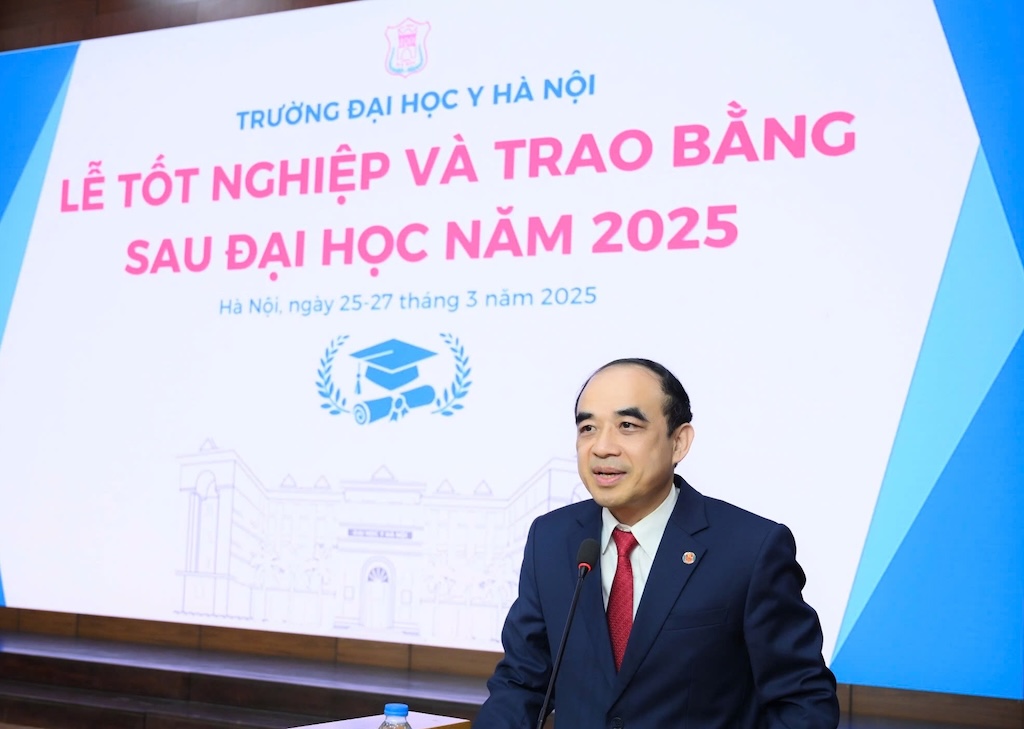Management models need to be clearly legalized
Optimal management model for public medical and pharmaceutical training institutions is being discussed by many experts, including opinions that the Ministry of Health should strengthen or directly manage to more closely link training and clinical practice.
Sharing with Lao Dong reporter about this issue, Prof. Dr. Nguyen Huu Tu - Principal of Hanoi Medical University said: Medical training is very unique - it cannot survive without a basis for practice. Medical schools and hospitals must be closely linked, even a single body in terms of responsibility, content and training philosophy.
"Medicine training is designed to provide human resources for the entire system, but it requires great costs and effort. Therefore, this must be considered a common task of the entire industry, from lecturers to medical staff at hospitals.
The management model needs to be clearly legalized to ensure sustainability, clearly defining the rights and responsibilities of both the school and the practice facilities" - said the Professor.

There needs to be practical solutions to train the "ethique" team of the medical industry
In medical training, resident doctors are a special field, this is considered the cradle of attracting high-quality human resources, towards international medical training standards.
Recently, at the working session of Deputy Prime Minister Le Thanh Long with Hanoi Medical University, Professor Nguyen Huu Tu proposed that the Government consider issuing regulations on funding for training in resident doctors and having a support mechanism for resident doctors during their study period; proposed to adjust the policy of compensation for tuition exemption and reduction for 6 specialized groups that are difficult to attract students, including: Mental health, plastic surgery, tuberculosis, infectious diseases and emergency resuscitation.
The proposal to exempt tuition fees, pay salaries or allowances for resident doctors is considered an important solution to attract and retain high-quality human resources for the medical industry. If realized, this policy will have a "dual impact" on input quality, learning motivation and the trend of students choosing specialties.
"Inpatients of Hanoi Medical University have been trained very selectively for many years, are the quintessence of the medical industry and have made many great contributions to the development of the industry" - Prof. Dr. Nguyen Huu Tu said.
The Professor also said: Currently, the inpatient training model has been expanded, the quota has increased many times, but I affirm that this is still the training program for the best quality specialist doctors in the industry.
Boarding doctors are studying and working day and night at leading hospitals, directly contributing to the daily medical examination and treatment work, so they deserve to receive the same treatment as medical staff.
"Many countries in the world pay salaries to resident doctors, and Vietnam has also implemented this allowance regime before. If the policy is restored, I believe it will have a very positive impact, helping to improve the quality of inpatient input, creating motivation to study and attracting students to difficult but essential majors for the health system" - Professor Tu said.
At the discussion session on draft laws on education and training, draft resolutions of the National Assembly on specific mechanisms and policies to implement the Politburo's resolution on breakthroughs in education and training development, expressing opinions related to training management, especially specialties in the health sector, delegate of Ho Chi Minh City Nguyen Tri Thuc - Deputy Minister of Health said: Specialists and resident doctors are the "petition of the elite" in the health sector, so considering training of specialties and resident doctors as training for practice certificates is completely incorrect. In fact, educational training in the medical industry is a field of practice science, learners always have to be attached to the hospital.
"I hope to propose that the National Assembly consider and pay attention to the education activities in the health sector that must be managed by the Ministry of Health" - delegate Nguyen Tri Thuc stated.
According to the delegate of Ho Chi Minh City, this issue is very important for the medical industry in the future. Because it is impossible to train a doctor separately from the hospital. From the second year, medical students have to practice and the doctor must consider patients as the greatest teacher of their life, not a book.
Delegate Nguyen Tri Thuc suggested that in the responsibility of managing education in the health sector, the Ministry of Health is the focal agency responsible to the Government for implementing the contents of state management tasks on specialized training, postgraduate qualifications in the field of health science.
Explaining the above proposal of the delegate, Minister of Education and Training Nguyen Kim Son affirmed that the Law on Higher Education does not interfere in the management and training of medical specialties, but only stipulates the general principle of undergraduate and master's training of sectors and fields in accordance with the state management scope assigned by the Ministry of Education and Training.
"The Ministry of Education does not interfere in the training of doctors in this specialty. The draft revised Law on Higher Education included in the content: Intensive training program in the field of health science, granting degrees of resident doctors and specialist doctors managed by the Ministry of Health.
This means that the Ministry of Education does not embrace and has never had the idea of bringing the schools of the Ministry of Health to it, about training in resident doctors and currently training in specialties still regulated by the Ministry of Health" - Minister Son affirmed.











